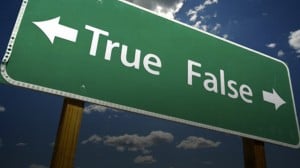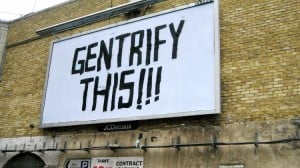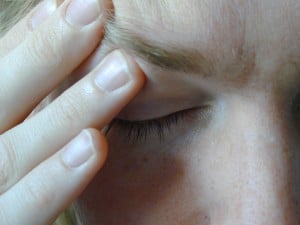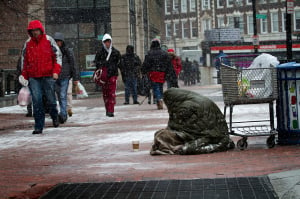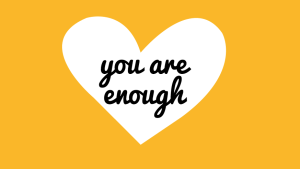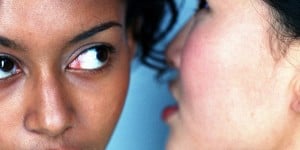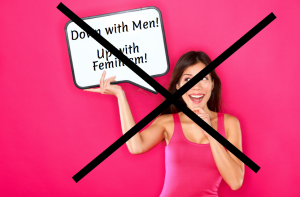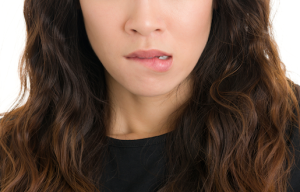Originally published on Eat The Damn Cake and cross-posted here with permission.
The other day a man wrote to me to tell me that I shouldn’t worry—I’m not that ugly. ”
You’re not stunning,” he told me, “But you’re not hideous, either. So get over it. Men don’t care. Men aren’t thinking about this stuff. It’s just a bunch of women, driving each other insane, waving mascara wands like tiny ineffectual swords, shouting “You look FAT in that!” at each other.”
No, he didn’t say that, about the eye makeup swords. He wasn’t that original. I know, because I get emails like his all the time.
Often they’re from nice men who want to reassure me. “You look good!” they say. “I read something you wrote and I thought you’d be worse looking, but then I found a picture, and you’re pretty! So don’t worry!”
Sometimes they tell me they’re really into women who look like me. “I know it’s not that common,” they tell me, “But I actually love big noses on women.”
But mostly they agree with each other that men don’t care. Men like them aren’t worrying about this stuff.
They think I look fine. They’d definitely have sex with me.
So what’s the matter? What’s the problem?
The problem is I don’t care.
It’s complicated, of course. I have always expected individual boys and men to find me beautiful, fall in love with me, get turned on just from looking at me, because individual boys and men always did. And at the same time it’s true that I’ve wanted more from men.
I’ve wanted to know that they approved of me, as a group. Because as a group, men have seemed supercharged and threatening, more likely than women to yell something insulting out, more likely to yell something complimentary.
Men have seemed more likely than women to try to summarize me to my face.
But in spite of all that, all of this body stuff– it was never actually about guys.
And it was never only about other girls and women.
It was always about the whole world.
It was always about what makes someone worthwhile.
And for girls, prettiness is always there, leaping ahead of other qualities, vaulting over unquenchable curiosity and innate talent at rhyming words in the middle of the stanza.
Sometimes I think, no, that can’t be right. We must be past all that. That’s just an old, tired cliché. But so many of the young women I know finally let something slip about the eating disorder they had in college. Just a quick mention, in passing. A footnote. A sidebar. And too often the older women are still there in front of the mirror, criticizing themselves, frightened of losing something essential, frightened of losing themselves.
This is not about men. But I do have to point out that men are involved. There’s a lot of evidence. I’ve sat in front of guys on the train. I’ve walked behind them in college, and heading home from the subway.
I’ve heard too many blunt dismissals and evaluations of women to pretend that men just don’t care or notice. I’ve been the friend who gets asked about my friend.
At a nightclub, where guys pushed by me to approach the girl I was with, nearly knocking me off my five inch heels. Where a few guys were forced to interact with me because I was with her, and one of them said, “What’s wrong with you? You shake hands like a man—“ his eyes sliding eagerly back to her.
Once when a friend of mine left the room, a guy came up to me and was like, “Your blond friend—was she looking at me? Do you think she’d go out with me?”
“She’s just visiting,” I said, “She lives across the country.”
“Damn,” he said. “She’s pretty.”
“Yup, she is,” I said.
He stood there a while, crestfallen, then, shifting tactics, he looked me up and down. “You’re OK, though,” he said. “Would you go out with me?”
There it is—that egalitarianism that people talk about. He was willing to have sex with me, too, at the end of the day. But he knew exactly what he wanted, and I didn’t look like it.
That story used to be painful for me. It felt like a dark secret. It felt shameful.
I tried to pretend these things never happened. I tried to pretend I hadn’t seen the way men looked at her and not at me.
But I knew I wasn’t the one any of the guys would choose first, when I went out with certain friends. We all knew it. I knew it, she knew it, they knew it.
I have had whole clever, thoughtful conversations with a guy only to have him turn to my silent, sexy friend at the last second and ask her to dance.
And less frequently, but sometimes, I’ve been the one who got all the attention, while another girl was ignored.
Men care. Men notice. This is about men, too.
But it is not all about men.
That would be a huge oversimplification. It’s presumptuous to imagine that all I (or any other woman who has expressed insecurity about her body) need is some male approval and a healthy dose of rationality.
“You look good enough to get a man,” said the last man who wrote to me. “So what’s the problem?”
The problem is I’m not trying to “get” a man. And most of my body insecurities have had very little to do with the desire to have one.
I have not tried to be prettier so that men would ask me out. Men asking me out was good. It was important. I would have been happy with more of it, I’m sure.
But my disappointment with my appearance, and the squirming, insistent anxiety that I didn’t look right, I didn’t look good enough — those things felt bigger than men.
They felt like they were about what I could accomplish. They felt like they were about me failing as a person. They felt like they were about everything, and everyone.
They felt like a prison with bars that inched forward, contorting, rearranging themselves into a tighter, smaller cell box, until sometimes it was just me and a mirror, locked up together for eternity.
For almost that whole time, I had a boyfriend.
A boyfriend who thought I was gorgeous. Who I loved. Who wanted nothing more than to photograph me in my underwear. Who begged me not to get a nose job. Who brought back pages of research on cosmetic surgery, trying to convince me to change my mind. Who celebrated the weight I gained.
I wish it was as simple as needing to prove that I could get a man.
I wish it was as simple as needing a compliment.
I wish it was as simple as just being reasonable.
I was reading an article about people jumping off the Golden Gate bridge. One of them was a thirteen year old girl. She did well in school, the reporter noted. She was pretty.
Actually, he mentioned that part first. She was pretty. I noticed it because it was annoying. Her mother found the suicide note later, tucked into a book.
The girl explained that she had killed herself because she was fat and ugly. She was sorry for leaving her parents like this, but she hoped they’d get over her quickly.
Because you know, it’s easier to get over the death of a fat and ugly daughter than one who is thin and pretty.
You can get into anomalous, abnormal psychological problems, and oh, we do, we definitely do, but for me, there’s a hard, flat truth at the bottom of it, and eventually you have to slam into it.
Something is wrong with the way we use beauty. Something is wrong with the way we allow it to be taught.
We learn it just fine. We learn it so quickly and readily. We memorize it perfectly, and we remember every word.
Recently, I went on Australian radio to blunder through an interview about what I thought, as a body image expert (ha!), about Lady Gaga’s weight gain.
The fantastically composed host shot some statistics at me—80 percent of Australian women, when polled by someone, confess that they feel bad about the way they look.
“What advice would you give them?” he asked me, jovial and bright-voiced.
Oh god.
“Um,” I said, and then I think I probably paused for a long time, in desperation. And then I said the only thing I could think of:
“I would tell them to take a long bath.”
I would tell them to enjoy the water. The warmth. Their nakedness. Their bodies. Without expectations. It feels good to have a body. To be naked in it, in a tub.
It’s good to be alone with your naked body sometimes.
Without the world rushing in for comparisons and opinions.
Without anyone explaining women to you.
Without anyone explaining yourself to you.
I didn’t say all that. I should have.
I probably got immediately confused and wandered off in another direction and starting mumbling something about how we should all be nicer to ourselves and each other and how we need world peace for real, guys, like, now.
But I was right about the tub.
The approval I need is my own. It’s not about men. It’s not about women.
It’s about me, the world, and my naked body.
It’s about learning to recognize the bars so that I can cut through them before they crush me.
So that I can learn a better definition of worth.
In my case, it might have something to do with rhyming words in the middle of the stanza.
Kate Fridkis blogs at Eat the Damn Cake. You can follow her on Twitter or check out the pictures of women eating cake that people send her.
Search our 3000+ articles!
Read our articles about:
Our online racial justice training
Used by hundreds of universities, non-profits, and businesses.
Click to learn more









